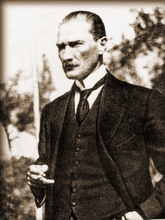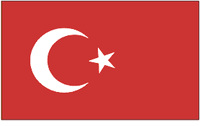Today, I was pleasantly surprised to learn that
my favorite Turkish/English site now includes a little button that lets me hear the word I'm looking up.
Harika!
Showing posts with label Dictionaries. Show all posts
Showing posts with label Dictionaries. Show all posts
Monday, March 5, 2007
Wednesday, February 21, 2007
Addressing People
In a sample dialogue (konuşma) in my textbook, a visitor to Turkey is greeted by an immigration officer. Their exchange included a predictable set of appropriate greetings.
One of them was memur bey, said by the visitor to the official. Literally, this means "official mister". But, the translation is similar to what you might say to a policeman approaching you: "Hello officer"...or "I didn't do it!!" (kidding, of course).
At www.turkishdictionary.net, the following information is provided on a search of bey:
1. gentleman, sir; a title meaning Mr. (used after a first name): Mehmet Bey.
2. prince, ruler, chieftain; chief, head, master.
3. notable, country gentleman.
4. playing cards ace.
In short, bey conveys respect.
Keeping that in mind, a common greeting by someone providing you with a service is beyefendi. Efendi means gentleman. Bey, in effect, stresses a positive message. It ends up meaning sir.
In the same vein, hanımefendi means madam. Efendi can apparently mean madam too as well as meaning sir.
Here's a phrase I'll likely be using often in Turkey: efendim? As in, "I beg your pardon! Sorry! Can you repeat that, please?"
The Turkish equivalents for Mr., Mrs. or Miss are Bey and Hanım, respectively. Curveball: Unlike English, Bey and Hanım are used with the first name, not the surname. So, instead of John Smith being called Mr. Smith, he's John Bey. His wife, Jane, would be Jane Hanım.
Practical use for bey: say you're trying to hail a bus driver, say şoför bey! The respect should come naturally — i.e., respect the fact that you want something from the driver: to stop!/durmak!
One of them was memur bey, said by the visitor to the official. Literally, this means "official mister". But, the translation is similar to what you might say to a policeman approaching you: "Hello officer"...or "I didn't do it!!" (kidding, of course).
At www.turkishdictionary.net, the following information is provided on a search of bey:
1. gentleman, sir; a title meaning Mr. (used after a first name): Mehmet Bey.
2. prince, ruler, chieftain; chief, head, master.
3. notable, country gentleman.
4. playing cards ace.
In short, bey conveys respect.
Keeping that in mind, a common greeting by someone providing you with a service is beyefendi. Efendi means gentleman. Bey, in effect, stresses a positive message. It ends up meaning sir.
In the same vein, hanımefendi means madam. Efendi can apparently mean madam too as well as meaning sir.
Here's a phrase I'll likely be using often in Turkey: efendim? As in, "I beg your pardon! Sorry! Can you repeat that, please?"
The Turkish equivalents for Mr., Mrs. or Miss are Bey and Hanım, respectively. Curveball: Unlike English, Bey and Hanım are used with the first name, not the surname. So, instead of John Smith being called Mr. Smith, he's John Bey. His wife, Jane, would be Jane Hanım.
Practical use for bey: say you're trying to hail a bus driver, say şoför bey! The respect should come naturally — i.e., respect the fact that you want something from the driver: to stop!/durmak!
Tuesday, February 20, 2007
Don't
According to my textbook, you tell someone not to do something by adding -me to the end of an informal command. Example follow.
Personal note: I like the word gülmek. Its full definition at www.turkishdictionary.net follows:
1. to laugh.
2. to be happy, experience happiness.
3. to have a good time, have fun.
4. /a/ to laugh at, make fun of.
5. /a/ to smile on. Gülerim!/Güleyim bari! Oh really?/How interesting! (sarcastic way of showing disbelief).
It's the root word for saying goodbye: Güle güle (said by the one who is staying to the one who is leaving).
Other pleasant variations follow:
Good luck! Güle güle gidin(iz).
Have a good trip! Güle güle giyin(iz).
There are more. However, www.turkishdictionary.net is offline as I type this entry. Hopefully, it'll be available by the time you read this.
- Gelmek: To come; Gelme!: Don't come!
- Yapmak: To do; Yapma!: Don't do!
- Koymak: To put; Koyma!: Don't put!
- Gülmek: To smile/laugh; Gülme!: Don't smile/Don't laugh!
- Gelmeyin!
- Yapmayınız!
- Koymayın!
- Gülmeyiniz!
Personal note: I like the word gülmek. Its full definition at www.turkishdictionary.net follows:
1. to laugh.
2. to be happy, experience happiness.
3. to have a good time, have fun.
4. /a/ to laugh at, make fun of.
5. /a/ to smile on. Gülerim!/Güleyim bari! Oh really?/How interesting! (sarcastic way of showing disbelief).
It's the root word for saying goodbye: Güle güle (said by the one who is staying to the one who is leaving).
Other pleasant variations follow:
Good luck! Güle güle gidin(iz).
Have a good trip! Güle güle giyin(iz).
There are more. However, www.turkishdictionary.net is offline as I type this entry. Hopefully, it'll be available by the time you read this.
Thursday, January 11, 2007
Hagia Sofia
 As part of starting here, I decided to post this lovely picture and identify some of its elements in Turkish.
As part of starting here, I decided to post this lovely picture and identify some of its elements in Turkish.Picture: resim
Lovely: güzel
Building: yapı
Grass: ot
Note: At http://www.turkishdictionary.net/, I'm finding multiple words for the same thing. For now at least, I'm just picking one out of the bunch and going with that. So, my listing of a one-to-one relationship between English and Turkish words is just my way of keeping it simple for myself at this phase.
Flowers: çiçekler
Bush: çalı
Tree: ağaç
Trees: ağaçler (??)
Small: az
Small tree: az ağaç
Dome: kubbe
Top: üst
Dome top: kubbe üst
Minaret: mınare
Minarets: minarelar (??)
Note: Wherever you see (??) that means I'm not sure. Please feel free to leave a comment if I mess it up or if I karışmak. :^)
Man: adam
Walking: yürüyor
Color: renk
Colors: renklı
That's it for now. Hoşça kal!
Subscribe to:
Posts (Atom)

